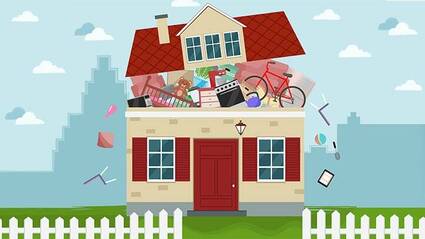By: Barbara Hager

All of us at times are messy people – we save too many things, or do just a bit too much shopping online, and pretty soon our homes are “cluttered” and full of junk. We get “joy” from all we own and will not get rid of anything! Does this mean we are hoarders?
There is a difference between having too much stuff and being a hoarder. The Association will know a true hoarding situation when the condition of a unit affects the health and sanitation of the neighboring units, not just the one messy unit. Vermin, cockroaches, the smell of dead animals (former pets not disposed of properly) and the smell of rotten food are all signs that someone is a hoarder. Hoarding is a recognized disability. True hoarding affects the neighboring units and threatens the health and safety of other unit owners and occupants. Hoarding also presents a serious fire hazard.
Because it is a recognized disability under the law, hoarding must be handled very delicately by the Board of Directors in order to avoid allegations of discrimination under fair housing laws. There should be no jokes, disparaging remarks or anything negative said at Board meetings or elsewhere about the hoarder. Although the rules usually say unit owners must keep their unit in “good condition” hoarders cannot be handled in the same perfunctory manner other violators of the rules are handled. Before fining or bringing the hoarder to court, due to fair housing and discriminations, the Association must try to assist the hoarder to clean up the unit. This is very different from simply calling in the violator of the rules for a hearing and then issuing a daily fine until he cleans up the unit. More cooperation and help by the Association is required.
A good place for the Board of Directors to start is to call the fire department, health department and or social services department of the municipality. Sometimes the fire marshal will issue orders to clean up the unit if it is a fire hazard. Additionally, municipalities may have social service departments or other advocates available to help hoarders deal with both their unit condition and their mental health condition.
If the municipalities cannot or will not help, the Board will want to begin its approach to the problem. It should first informally call the unit owner in to discuss (in executive session only, not publicly) the Association’s offer to help. Additionally, if there are other relatives or unit owners who are friends or relatives of the hoarder the Board might ask them for assistance in approaching the problem. Fines can be levied but first give the unit owner a reasonable period of time to do a basic clean up. However, the hoarder may simply pay the fines but do nothing to change or clean out the unit. Then the Board may consider bringing an action in court seeking a court order (injunction) to have the judge require the hoarder to clean up their unit. Of course, if the hoarder does not pay the fines, after the fines exceed two months of common charges the Board may proceed with foreclosure.
Judges may be reluctant to order the hoarder to clean up unless the Association has sufficient evidence (from neighbors, health department, fire department, social workers etc.) about the extent of the problem and how it is threatening the health and safety of other unit owners. Therefore, it is important to keep detailed records of the situation. Contact legal counsel should you have any issues regarding hoarders and would like legal advice on how to handle the situation.

